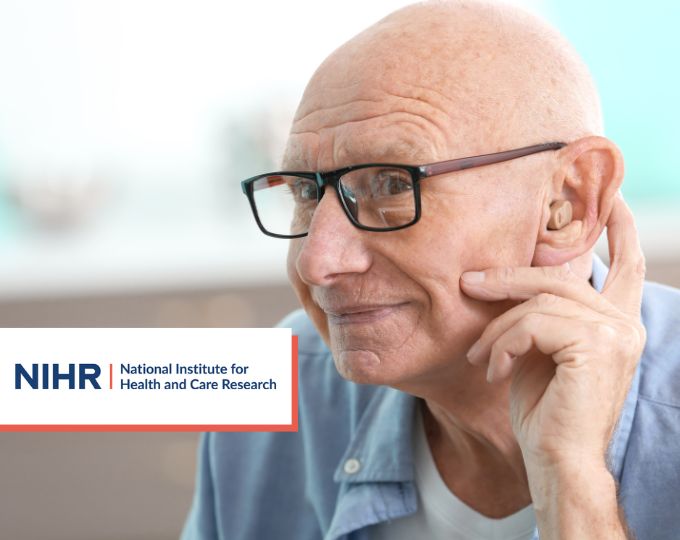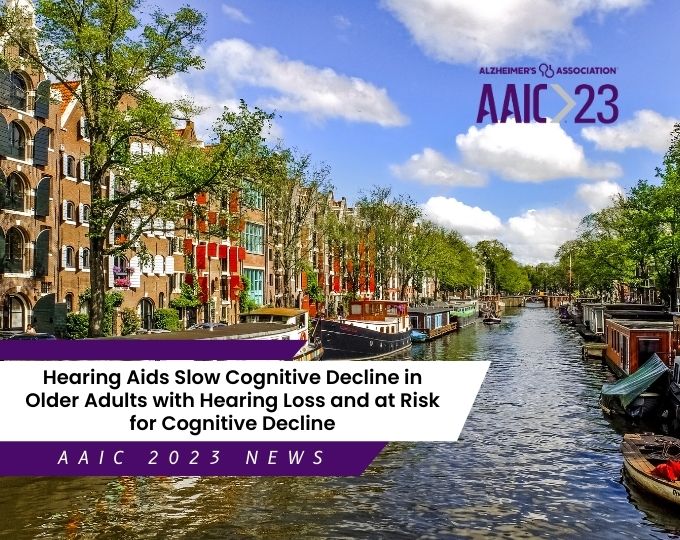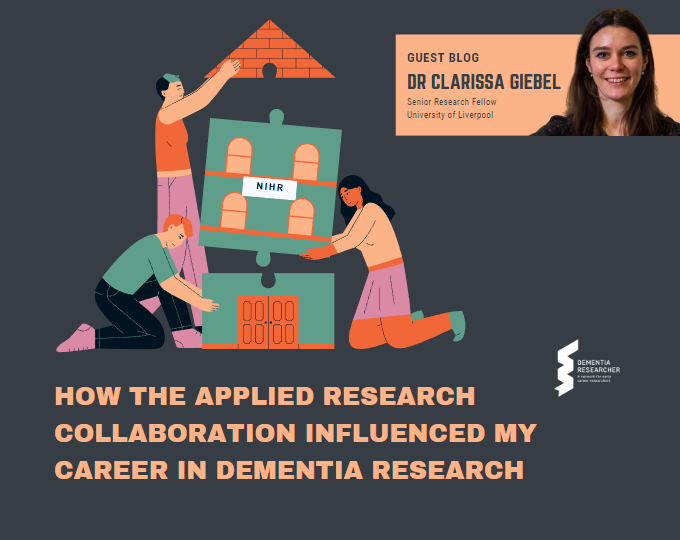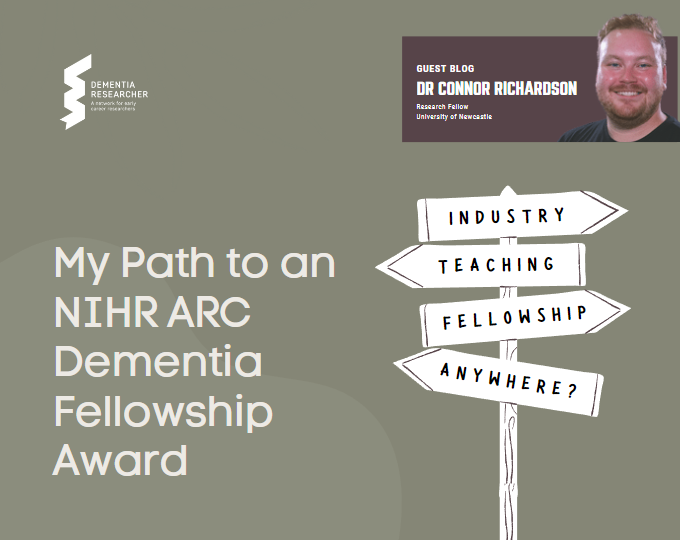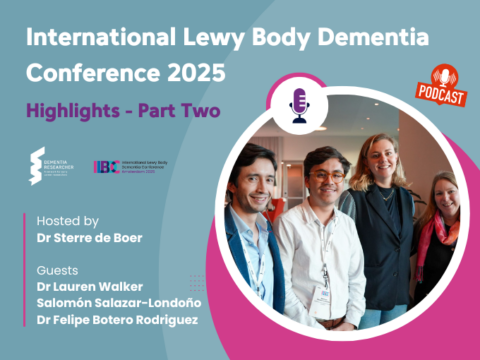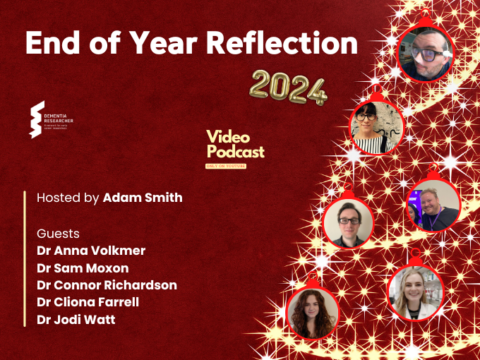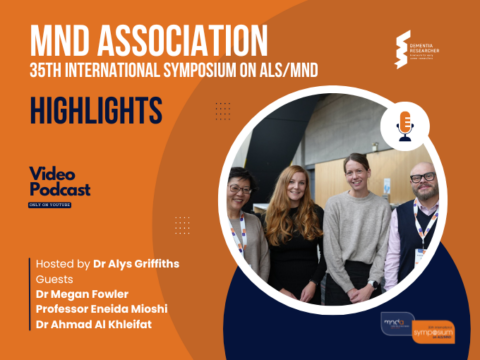The Minds in Motion Podcast from Dementia Researcher in association with the NIHR Applied Research Collaborations and Alzheimer’s Society, brings together NIHR Dem Comm Research Fellows, to talk about their research and careers.
In this first series, five of the Dem Comm Fellows each take a turn as co-host and guest. Alongside the researchers we have the incredible Trevor Salomon, Alzheimer’s Society Volunteer & Vice-Chairperson of the European Dementia Carers Working Group as our permanent co-host and anchor.
In this show Trevor is joined by Dr Neil Chadborn from University of Nottingham and NIHR Applied Research Collaboration (ARC) East Midlands to interview Dr Megan Rose Readman.
Megan works at the University of Liverpool and NIHR ARC North West Coast. She discusses her research to understand the connections between hearing loss and atypical types of dementia, specifically Parkinson’s Disease Dementia and Lewy Body Dementia. We also get her career tips, and explore how people living with dementia’s lives are affected by hearing and what can be improved.
Dem Comm is a 2 year programme funded by the National Institute of Health and Care Research and the Alzheimer's Society. It supports a new generation of dementia research leaders, bringing together researchers from different multidisciplinary backgrounds to encourage cross-cutting and community-orientated dementia research projects that can address key gaps in the evidence around dementia care and support, delivering transformative translational research.
The Minds in Motion Podcast from Dementia Researcher in association with the NIHR Applied Research Collaborations and Alzheimer's Society showcasing exciting new research and the work of the Dem Comm Fellows.
Dr Neil Chadborn:
Hello and welcome to the first episode of Minds in Motion, a brand-new podcast series from Dementia Researcher. Every day this week, we've got five researchers who will take it in turn as show hosts and they'll interview one of the other four. And all of this will be overseen by our permanent anchor, the brilliant Trevor Salomon. Today we start by hearing from Dr Megan Rose Readman from University of Liverpool, who's going to talk to us about her work on the relationship between hearing loss, Parkinson's disease, and dementias.
Hello, I'm Dr Neil Chadborn, and I'm a Dementia Community of Practise Research fellow at NIHR Applied Research collaboration East Midlands. I work at University of Nottingham, and I'm delighted to be here to host the very first show in this new series. I work on intergenerational storytelling using digital technology to support sharing memories for South Asian community. However, you'll learn more about me in the last show of the week. But for now, let me introduce my co-host, Trevor Salomon.
Trevor Salomon:
Many thanks, Neil. Hello, I am Trevor Salomon. I'm an Alzheimer's Society volunteer and I'm also Vice-chair of the European Dementia Carers Working Group. My passion and involvement are driven through the time I've spent as a full-time carer for my wife Yvonne, who was diagnosed with young onset Alzheimer's disease in 2013 when she was just 57. Since 2019 when she became doubly incontinent and I could no longer recharge my batteries, she's been living in a care home and very well looked after.
Through this podcast series, we will be hearing about some of the incredible research being delivered as part of the Dementia Communities Fellowship Programme, or Dem Comm for short. This is an NIHR Applied Research Collaborations and Alzheimer's Society partnership, which promises to deliver the next generation social science research leaders. Let's meet our very first guest, Dr Megan Rose Readman.
Dr Megan Rose Readman:
Hi. So, thank you very much for having me today. Really looking forward to being here. So, I am Megan. I am a postdoctoral research fellow in the applied research collaboration based in the Northwest coast. Prior to this position, I was an ESRC-funded postdoc fellow, and I was looking at the relationship between hearing loss and Parkinson's disease, and I'm now kind of developing that work, looking more at atypical types of dementia, specifically Parkinson's dementia, and dementia with Lewy bodies. But I'm sure we'll get into that in a little bit more detail soon.
Trevor Salomon:
We definitely will, Megan. So, you've given us a top liner about what your research is. Can you tell us a little bit more about it in some detail please?
Dr Megan Rose Readman:
Yeah, for sure. So, some of you may have seen, there's been quite a lot of evidence that's come out over the last sort of 10 years that is suggesting that hearing loss may be a potentially modifiable risk factor for dementia. So, what that essentially means is that having a hearing impairment may increase the likelihood of someone later going on to develop dementia.
This body of evidence is quite robust. There is quite a lot in terms of volume, but what this sort of body of evidence really lacks in is it considers dementia as a whole. So, what we really don't know is whether hearing loss is a risk factor for all types of dementia, or whether it's specific to different types of dementia. So, when these studies have been used big databases, as we know Alzheimer's disease dementia is the most common type of dementia. It may be that hearing loss is only a risk factor for Alzheimer's disease dementia, but not the other more rare forms of dementia like Lewy body dementia or Parkinson's disease dementia.
What we're kind of trying to do, and what I'm trying to do in this project is unpick this picture a little bit more and look at whether hearing loss is influencing the likelihood of somebody going on to develop dementia in these rarer subtypes or whether it is just something that's related to Alzheimer's disease dementia.
And the other thing that I'm also hoping to look into is we know loads about the statistical relationship and all this, but what we don't really know is actually how its impacting people living with dementia. So how does having a hearing loss and dementia actually impact their lives? Does it make things more difficult and things like that. So, I'm also doing some data collection and some interviews to try and unpick a bit more as to how hearing loss may actually impact people on a day-to-day basis.
Dr Neil Chadborn:
I'm really interested in the links there potentially between Parkinson's disease and dementia. And I wonder whether you're sort of hinting that hearing loss may be part of that link. And I wonder if you can tell us a bit more about, for example, non-motor symptoms of Parkinson's. Explain that a bit more, and is hearing loss linked to that?
Dr Megan Rose Readman:
Yeah, so there is some evidence, there's literally only three papers out there, one of which is actually my work. But there is some evidence that suggests that hearing loss is a risk factor for Parkinson's disease. So, it's predating the motor manifestation of Parkinson's disease. But really, again, kind of as I've alluded to all this body of literature that looks at hearing loss in relation to both all caused dementia, but Parkinson's and rarer forms of dementia tends to focus in on the statistical big data relationship. So, we haven't actually been able to unpick how it's related to the non-motor symptoms, for example.
So, we don't really understand that in essence. But what we are seeing, say from my public engagement work for example, and some of the interviews we've started, we are kind of starting to see that some people are suggesting that having hearing loss, it is making it more difficult for people to have clarity of thought, for example. And obviously you can understand that having hearing loss may affect your balance or your walking, but those more nuanced relationships in terms of clarity of thoughts and hallucinations are right at the beginning that we're starting to tease apart. But there is a very long way to go, I must admit.
Trevor Salomon:
Megan, what drew your interest in terms of this study, the relationship between hearing loss and atypical dementias?
Dr Megan Rose Readman:
If I'm quite honest with you, Trevor, it is a personal reason. So, my partner's mum was diagnosed with Parkinson's in her forties. It transpired that she actually had a more aggressive form of multiple systems atrophy. So that's kind of where the draw comes to look at Parkinson's and Parkinson's related disorders. But in the broader picture, what we see every day is there's so many amazing, exciting pieces of work going on in the dementia sphere, but a lot of those do really focus in on Alzheimer's disease dementias and the more well-known types of dementia. And unfortunately, if you look at the landscape and our understanding of dementias, you've got a really great understanding of Alzheimer's up here, but our understanding of Lewy body dementia and Parkinson's dementia, it is right down here in comparison. So that kind of drives me to want to focus in on that to level it up and bring our understanding and our knowledge of those rarer types of dementia up, because Lewy body dementia is the second most common type of dementia outside of Alzheimer's disease dementia. So, it is really important for us to reflect on.
Trevor Salomon:
Yeah, no, I wondered if there might be a personal reason, and thank you for sharing that. There often is in research, isn't there? If you've been touched by something.
Dr Megan Rose Readman:
Yeah, definitely. And I think it is really important for us to reflect on that and how that may be influencing our practise as researchers. It definitely from those experiences, it makes you think of it in a different way, which is really great, but there may also be drawbacks to that, like the emotional side. So, it's just to acknowledge it definitely, and it definitely makes me more passionate, shall we say.
Dr Neil Chadborn:
Maybe following on from that, we're talking about the impact of hearing loss. Maybe you can say a bit more about whether your patient and public involvement, consultation, or views from participants in your studies, what comments and experiences have they shared with you?
Dr Megan Rose Readman:
Yeah, so as you mentioned, Neil, the patient and public involvement has been absolutely central. And if we take it way back to actually the start of my ESRC postdoc fellowship, it was a really off the cuff blasé comment that I had from somebody who lives with Parkinson's that got me ticking and thinking about hearing loss in this context.
In the first instance, this individual just passively says, "Oh, when I go to my support cafe, you'd be hard picked to find someone not wearing a hearing aid." And I was like, okay, let's unpick this. Let's see a little bit more and have a chat about it. So that individual actually, I'm really, really grateful, and fortunate, has been part of this research journey from that comment up until today, which is really fantastic.
So yeah, we've been kind of drawing from different lived experiences throughout. So, I'm in the process of writing up a protocol for a big quantitative analysis and two people who live with Lewy body dementias and one person who cares have been consulting on what measures they think are really important for us to include. So, they've been given advice like, "Oh, make sure you include a hallucination measure. Make sure you include this." So, these individuals really have shaped that proposal and completely guided where we go with it and reflecting on their personal experiences has really driven the way we're looking, if I'm honest with you.
Trevor Salomon:
Yeah, Megan, thinking about what you just said in terms of the number of people turning up at clinics wearing hearing aids, what are your insights on either genetic or environmental factors that may link hearing loss with these types of dementia?
Dr Megan Rose Readman:
Yeah, this is really, really, really great question. Something that we need to be really focusing in on. So unfortunately, as it stands right now, there is no evidence for us linking congenital hearing loss to dementia. Unfortunately, the data's just not there. Nobody has followed infants right up to the age of at which they would potentially show dementia. So, everything that I would mention is hypothesis-driven, not necessarily data-driven, but there are kind of a few reasons why we think hearing loss may be related to dementia.
And one of those things is sort of based on a neural pathology, which may, like you said, Trevor, be related to genetics. It equally may not be, but there may be some sort of genetic influence there.
Alternatively, it could be an influence from the environment like neurotoxicity, for example. But like I said, this whole body of research is very much, we're still finding our feet. We're in its infancy. There is no firm conclusion that it's genetic or it is environmental. But if you look at the literature, I think people would be more swaying towards environmental influences. So, some of the hypotheses purely rest on social interaction, for example. If you have a hearing impairment, you might withdraw from society because it's really difficult for you to engage in conversations. And in doing that, you may end up not using the cognitive functions, which then may lead for them to become impaired. If you don't use it, you lose it situation.
So, like I said, the evidence, the data isn't there yet. So, we are really hypothesis-driven and we're just trying to feel it out. But it does, I would assume, or I would from my perspective say if anything it's going to be a genes and environment interaction, but the environment definitely can't be ignored in that circumstance.
Dr Neil Chadborn:
I wonder if I can bring it back to a sort of practical aspects in some ways, but also talk about some potential collaborations and different professional perspectives. So, it's an interesting mix of two different topics. Obviously, we know that dementia is the psychiatrist's domain. Parkinson's is likely to be dressed by geriatricians, movement, focusing on movement primarily. So that's sort of two different elements of the health service that patients may find themselves in. So, I wonder if that shapes their experience and what services they receive and then how you might contact and collaborate with those two slightly different perspectives of physical health and mental health on the other hand.
Dr Megan Rose Readman:
Yeah, what we tend to see is most people who live with Parkinson's, Parkinson's dementia, or dementia with Lewy bodies are primarily seen by a neurologist, and that tends to be the specialism. So, we're currently collaborating with neurologists at the Walton Centre Mersey Care and in Grace Manchester there. But you've already highlighted Neil. It's such a fragmented experience for people who are living with these specific types of dementia. That is really hard. And this is one of the things that not personally myself, but I know other people are considering is, where would hearing fit in that space? At what point would the audiologist be brought in to provide support for the individual living with dementia?
So in this sort of next phase of research that I will be coming into, hopefully soon, maybe not, but you never know, we are hoping to bring together audiologists, neurologists, movement disorder specialists, and bring everyone together to sort of figure out a little bit more about what needs to be done to support these people and where it's best placed for the support to occur.
People, like you've mentioned, people who live with Parkinson's and see their neurologists it is quite infrequently, but more frequently than anyone else. So, for Parkinson's, it may be better placed there, but somebody who lives with Lewy body, for example, they may be slightly seeing a different group of people more frequently. So, if they went to clinic with memory complaints before the movement problems, they may be more associated with the memory clinic, for example. So, it's really difficult, and it may be that we have to address it differently for different circumstances, and that's one of the main things that's kind of underlying everything that I'm looking at. I want to, basically, the big picture is to look at whether we should be addressing hearing loss in the concept of dementia in the same way for every type of dementia or not, which I know is an absolute logistical nightmare for the NHNs, but we can try.
Dr Neil Chadborn:
Maybe I can just follow that up then with a question about theoretical framework. Are you considering or developing some theory that links these two sorts of specialties or?
Dr Megan Rose Readman:
Yeah, so the theoretical framework we are working within links back to kind of what I was mentioning to Trevor before. But yeah, there's four main hypotheses as to how hearing loss may be related to dementia. I won't bore you with going into them because they're very long and complex. But yeah, those are the core theoretical frameworks that we link back to. And if I'm honest with you, when you look at the research that's considering hearing loss in the context of dementia, it's probably maybe like five to 10 years behind the research that looks at other aspects of dementia, for example. So, we are very new. We're treading unknown waters as to what services should be involved and where it should be involved. Should it be a primary care issue? Is it a secondary care issue? We don't know. And unfortunately, when I do speak to people who live with these types of dementia, it really does appear that it's not an issue that's dealt with in primary or secondary care. People end up having to go private. It's what the situation is now. It's not... People aren't using services provided by the National Health Service. They are going private to have this issue addressed.
Trevor Salomon:
And I bring you back to my personal situation, and I know these conversations mostly focused on Parkinson's disease, dementia, and Lewy body dementia but as I said in my introduction, my wife had Alzheimer's and there came a point in the progression of her Alzheimer's where I thought she was losing her hearing. And in fact, I then started to do some reading about this. I read about something called the cocktail party syndrome, and what I realised was she wasn't losing her hearing, but her Alzheimer's was preventing her from concentrating on multiple conversations. So, I'm just wondering in your research if you've looked at interventions for hearing loss after diagnosis?
Dr Megan Rose Readman:
I haven't personally got to this step yet because we're still working on the primary evidence. There isn't any evidence looking at Lewy body in this field. But a really, really big deal famous professor has started to look at whether providing somebody with a hearing aid actually reduces cognitive decline and helps cognition in people who live with dementia. Very, very early evidence. It was literally launched at AAIC last year at the preliminary findings. They are somewhat promising.
These findings do suggest in some individuals having a hearing aid may reduce the cognitive decline, but I stress some individuals. The analysis showed that this intervention was only beneficial for people of ethnic minorities and low socioeconomic background. So, people who already potentially have quite a high-risk burden for later dementia, the hearing treatment is providing some benefit, but to people who may potentially have a lower risk [inaudible 00:21:10], the hearing intervention wasn't having quite the same effect.
However, that is not to say that a hearing aid isn't beneficial for somebody living with dementia, because obviously what we do see, and the evidence is way stronger and way more compelling in this direction, but we do see if we give people who are having memory complaints a hearing aid, they're increasing their social engagements, getting out and about and doing more things, which obviously is a massive benefit in terms of quality of life. It doesn't always necessarily have to be about slowing cognitive decline. If it's going to help them in terms of socialisation, that's still a benefit, right? But it may not necessarily be that the intervention of putting in a hearing aid does reduce cognitive decline, which then links back to the hypothesis that may potentially suggest that the two are related on a neural level rather than an environmental level.
Trevor Salomon:
I know somebody who's been living with Lewy body dementia for a number of years. I think I'm right in saying he's just had a cochlear implant and his world has been positively transformed by it. The hallucinations have stopped, he's sleeping better, and he's like a transformed individual.
Dr Megan Rose Readman:
Exactly. Yeah. And that's exactly what I've been hearing when I've been speaking to people. They've been saying, "Oh, all of a sudden everything's just easier."
Trevor Salomon:
Yes, I think he used that word actually. Everything's just easier.
Dr Megan Rose Readman:
Yeah. Yeah/ So even if it's not potentially slowing cognitive decline, if it's helping someone, then it's a win.
Trevor Salomon:
Definitely.
Dr Neil Chadborn:
Megan, you've told us some of your big ideas and future directions. Can you tell us a bit about your next steps over the next few months?
Dr Megan Rose Readman:
Over the next few months, I'm hoping to collect all this primary evidence. We did have plans and hope to use large scale databases, but unfortunately, these large-scale databases don't actually code Lewy body dementia, which is a nightmare. So, we can't use those sorts of things. So, the plan over the next few months is to really home in and crack on with the collecting of the primary evidence.
And again, as I've said several times, always, always, always keep talking to people who live with Lewy body dementia. I want to hear stories, the good, the bad, the ugly, not cherry-pick things that fit with our ideas. So, any opportunity that we can have to speak to people about this sort of thing as well is top priority over the next few months.
Trevor Salomon:
Just thinking about what you said there, Megan, has any of your work involved you collaborating at all with the Royal National Institute for the Deaf?
Dr Megan Rose Readman:
That's something that we're working with at the minute. So, we're trying to build a collaboration with colleagues at the RNID. So yeah, to hopefully produce some sort of information booklets and things like that for people who live with dementia. We haven't actually had the opportunity to collaborate with them just yet, but it is a goal. I really want to, and I will keep trying, nonetheless. But yeah, that's definitely the way we would like to.
As I'm sure your base will appreciate, if somebody is living with a hearing impairment and has dementia, they're not only going to go to the Alzheimer's Society for support, for example. They may also go to hearing charities and things like that. So, we do need to be ensuring that both dementia-focused charities, but also hearing loss-focused charities have equal support for those individuals.
Dr Neil Chadborn:
Thanks, Megan. We've been really interested in your research and future direction, but now we'd like to move on to hear a bit more about your career development and tips to other researchers in the field.
So, these are supposed to be quickfire questions, although I'm sure the answers might be longer than we anticipate.
Trevor Salomon:
Megan, here's the first one. Could you share your journey towards this post and this field please? And what were the key decisions and experiences that guided you to this niche?
Dr Megan Rose Readman:
Undergrad psychology at Lancaster University, you'll see the common trend. Masters in psychological research methods at Lancaster University. I did a PhD in clinical cognitive neuroscience at Lancaster University, and then I did my first pay stock with the Economic Social Research Council at Lancaster University. So, you can see I was kind of born through the system at Lancaster. Didn't really vary too much.
In terms of key things that made my decision to go into the niche, if I'm honest with you, it's definitely got to be Sam and the family experience there that's pushed me into that niche. And if I'm honest with you, I can say standing here right now, I won't ever plan to leave that niche because of those connections.
Dr Neil Chadborn:
Thanks. Throughout your career, what have been some of the significant challenges that you've faced in your research and academic development? And maybe you can say how you've overcome some of them.
Dr Megan Rose Readman:
I definitely think my biggest thing that I've struggled with is perfectionism, because in the world of academia, you can just keep going and keep going. Nothing is ever perfect. You could completely drive yourself insane and go forever. And the sage advice I received from my PhD supervisor once is, sometimes some things just have to be good enough. And it took a very, very long time to get there, to realise that those forms or the admin doesn't need to be publishable manuscript policy or whatsoever. But yeah, and it's acknowledging that it's no indication on you and you shouldn't be hard on yourself. And sometimes some things deserve more time, effort, and energy than other things.
Trevor Salomon:
Well, it's a slightly longer question for you demanding a short answer. For someone looking to enter the field of neurodegenerative disease research, particularly focusing on the sensory aspects like hearing loss, what advice would you give regarding education, skill development, and research opportunities, Megan?
Dr Megan Rose Readman:
In terms of going into that neurodegenerative research, it's incredibly supportive field. I've found massive support from colleagues at conferences and networking events. And in terms of one that you're thinking about different sensory processing, there is a lot of commonalities between the more, so say for example, my PhD focused on visual perception, and now I'm focusing more on auditory perception. And those skills are very transferable. So, if you were to work as in a domain that's looking at visual processes, that doesn't mean that you can never go into audiology, for example. There is a lot of overlap there.
Dr Neil Chadborn:
So maybe an easier one. What's the single most important thing you've learned from your fellowship so far?
Dr Megan Rose Readman:
Collaboration is key, and to acknowledge your weaknesses is somebody else's strength. And you don't necessarily have to then go away and do all the research in the world to become skilled at that. Just collaborate with someone. Two heads work better than one. You can bounce ideas off each other. Our fellowship offers the best perfect opportunity to collaborate with people in different fields from different walks of life. And it really comes into light and shows that you don't have to be an expert at everything. Collaboration is absolutely fantastic.
Trevor Salomon:
That's what teamwork's all about, isn't it? Everybody has strengths, everybody has weaknesses, but together you are brilliant. And so, I think I like that word collaboration.
Dr Megan Rose Readman:
Exactly. It's like the concept of the whole is more than the sum of the parts.
Trevor Salomon:
Exactly. So, we've covered the really serious stuff. We thought we'd like to end with some fun questions for you, Megan. So, here's the first one. If you could time travel to any period in history, when would you go to share your knowledge about dementia and why?
Dr Megan Rose Readman:
I think I'd probably go a few years ahead of now because what we're starting to actually see now is some quite concerning trends in younger people in terms of their noise exposure. For example, so we see a lot of younger people... I mean, I have some need to talk, I've got headphones in right now, but we see a lot of younger people blasting the music through their headphones, going to loud concerts. It's not cooled to wear earbuds, but it's safe and it's beneficial. So, we do have concerns that hearing impairments and hearing problems are on the rise. And if this relationship between hearing impairments and dementia stands, then that's really quite concerning. So, I think, yeah, a few years from now or even now, it's really important given the societal changes in younger people's behaviours in terms of their hearing.
Trevor Salomon:
Believe it or not, I was young once, and I wouldn't have listened to, and I didn't listen to any advice anybody gave me when I was younger. So how are we going to break through and make people understand that bombarding their hearing with too much noise is potentially going to give them some health problems later on? And I don't just mean hearing loss.
Dr Megan Rose Readman:
Exactly. I think it is a real difficulty. And I think we have to look to what influences younger people. So, I have two nephews. My oldest nephew, he's a teenager, and I know the things that influence Leo are like social media, online engagement. So, we do need to be looking to these influencers, whatever you want to call them, because if we do want to insight long-term system change in younger, we need to go with what they like. They don't want to listen to the teacher at the front of the room, because it's not cool, but that person on TikTok is the bee's knees. But yeah, I'm not volunteering to be a TikTok influencer.
Dr Neil Chadborn:
Well, talking about linking with other people, if you could collaborate with someone in your dementia research and someone who's a fictional character, which fictional character would you choose to work with?
Dr Megan Rose Readman:
You know Belle from Beauty and the Beast? Obviously, she spends so much time reading books and searching for knowledge and not taking things on surface value. So, when she meets the beast, she doesn't take it under surface value and be like, oh, that's a horrible creature. She digs within and sees underneath and takes away the facade and looks deeper within. And I think in the terms of the research that I'm doing with that, you can't just look at the big picture, the facade that faces you. You really do need to dig within to unpick things. So probably her, and because it's Emma Watson.
Trevor Salomon:
I'm afraid that's all we have time for today. But I'll be back tomorrow, and we'll be joined again by Megan this time taking over as host. If you want to learn more about this topic or the Dem Comm programme, visit the Dementia Researcher website where you'll find a full transcript, links mentioned in the show, and much more. I would like to thank our incredible guest, Dr Megan Rose Readman. I'm Trevor Salomon.
Dr Neil Chadborn:
And I'm Dr Neil Chadborn. Thank you so much for joining us.
Trevor Salomon:
Thanks. Bye-Bye.
Voice Over:
You've been listening to The Minds in Motion podcast from Dementia Researcher in association with the NIHR Applied Research Collaborations and Alzheimer's Society. To learn more about the Dem Comm programme, and to get all the support you need, visit dementiaresearcher.nihr.ac.uk. And don't forget to like and subscribe.
END
Like what you hear? Please review, like, and share our podcast - and don't forget to subscribe to ensure you never miss an episode.
If you would like to share your own experiences or discuss your research in a blog or on a podcast, drop us a line to dementiaresearcher@ucl.ac.uk
Did you know... you can find our podcast in your favourite podcast app on mobile devices, and our narrated blogs are also available as a podcast.
This podcast is brought to you in association with the Alzheimer's Association, Alzheimer's Research UK, Race Against Dementia and Alzheimer's Society, who we thank for their ongoing support.
The views and opinions expressed by the host and guests in this podcast represent those of the guests and do not necessarily reflect those of UCL or Dementia Researcher

 Print This Post
Print This Post



